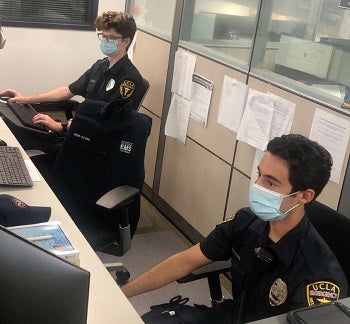UCLA Administration has been at the forefront of the campus response to COVID-19, including maintaining essential on-campus operations and supporting staff, faculty, and students who are working remotely from home. Each of our 11 divisions has risen to challenge, responding with resiliency and determination. The highlights of activities this summer illuminate how crucial UCLA Administration has been to the campus response efforts.
Business Transformation Office
When BTO’s leadership team was setting priorities for 2020, major system implementations—Learning Management System, Ascend, and Financial Aid System Replacement—were top of mind. No one imagined that work would include supporting UCLA’s campus wide emergency response to a global pandemic. But we all know what they say about those best laid plans.
It turns out that BTO’s team had the right range of skills to support the unforeseen need. Process-optimization, problem-solving, data analysis, general coordination, and just thinking on their feet are all in a day’s work for the BTO. Thus far, BTO has led and executed:
- Implementation of Salesforce work.com to support Symptom Monitoring and Contact Tracing
- Case Counts dashboard
- Online tools and processes to:
- Optimize remote collaboration for the Emergency Operations Center
- Implement directives from LA County and UC Health orders
- Payroll expense tracking for FEMA reporting in UCPath
- Analysis, projections, and modeling to support Fall academic planning
- Project coordination to stand-up COVID Community Screening for Fall Return to Campus
The team found it gratifying to be able to contribute alongside an amazing team from all areas of the University.
Campus Human Resources
In times of crisis, such as the one we are currently experiencing, Campus Human Resources (CHR) plays a key role in supporting the campus and addressing the needs of UCLA’s employees. Since the pandemic began, top priorities have included developing talent strategies, addressing well-being and work-life challenges, facilitating use of leave opportunities, and providing critical information on University policies designed to ease the impact of the health emergency on staff.
The changes in our work environment have been rapid and sweeping, with the need for resources to help employees navigate this new landscape. Seemingly overnight, staff shifted from a campus environment to a remote one. And the CHR team has been working tirelessly to provide guidance, tools, and resources to ensure employees adapt to the new work environment.
Here are just some of CHR’s COVID-related actions during the past few months:
- Creation of the UCLA Talent Match Program, to provide job reassignment opportunities for current staff and student employees.
- Policy guidance on use of COVID-19 Leaves.
- Training for managers on how to lead teams effectively in the remote work environment
- Customization of online workshops for training and employee development.
- Remote access to counseling sessions for employees and their families dealing with COVID-19 issues, as well as support groups for departments.
- Redeployment opportunities to support continuing productivity for employees whose work has declined due to the pandemic.
CHR created a dedicated web page featuring COVID updates for UCLA employees. Here, staff can easily find information on leave policies; health, welfare and retirement benefits; remote-work guidelines; and Frequently Asked Questions, to name a few.
It is not “business-as-usual” anymore. The changes underway during the pandemic in support of health, welfare, and well-being, will result in the redesign of how work is defined and conducted for many years to come.
Central Ticket Office
With the cancelation of all events since mid-March, CTO spent a few months heavily focused on refunding all ticket purchasers.
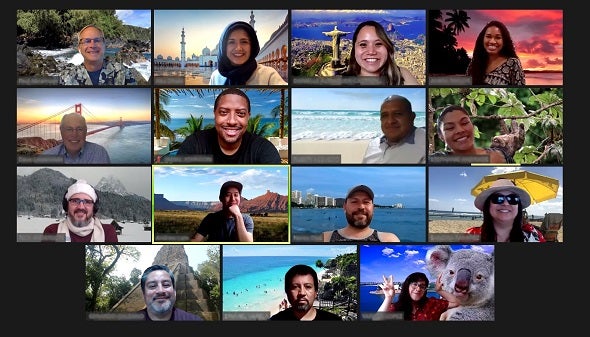
With the uncertainty of the fall, CTO staff also assisted clients with their fall plans. For athletics, this involved supporting them with their Bruin Support Program, which provided season ticket holders the opportunity to either reinvest their 2020 ticket purchase into a direct donation to the Wooden Athletic Fund or to roll over their ticket purchases and lock in pricing for the 2021 seasons. Most season ticket holders took one of these options. Some season ticket holders chose to receive a full refund. For Performing Arts this involved providing sales support for their online fall program which is similar to our normal daily responsibilities.
In short, CTO has been busy and productive, helping ticket holders and working to keep the campus community engaged in online programming.
Environment, Health & Safety
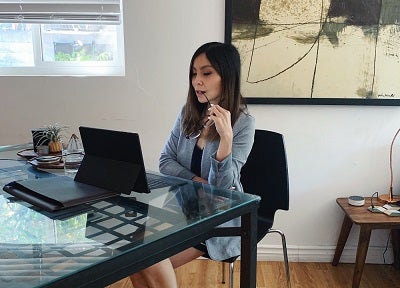
As its name suggests, Environment, Health & Safety (EH&S) has been front and center during the campus COVID-19 response, both through its day-to-day response to evolving campus needs, as well as its pivotal role in driving the Emergency Operations Center (EOC).
COVID-19 EOC functions, led by EH&S Executive Officer Michelle Sityar as EOC Director, operate under the delegation of authority from UCLA Chancellor Gene Block. EOC membership reflects all campus areas of operation—from finance and housing, to legal counsel and facilities management, among others. In addition to responding to the first pandemic of our lifetimes, the current EOC also holds a unique distinction: In true COVID-19 safety response fashion, it is the first UCLA EOC to operate in an entirely virtual space, utilizing WebEx and Zoom as methods of group interaction. It can also claim the distinction of being UCLA’s first EOC to operate under a dual activation during the summer’s protests near campus in addition to pandemic response.
During the past several months, the campuswide group has played the critical role of providing UCLA leadership with COVID-19-related guidance, recommendations and reports, while continuing general emergency management oversight. The group also creates and executes countless mitigation protocols and procedures that affect all UCLA campus populations. These are pursuant to state and local public health orders and protocols. They include, but are not limited to:
- Symptom monitoring and screening
- Universal face covering requirement (including procurement and distribution of face coverings and supplies to campus for COVID-19 exposure mitigation)
- Safe and Physical distancing
- Protocol for responding to COVID-19 cases on the UCLA campus
- Not coming to campus for any purpose if sick or symptoms are present
- Not coming to campus if exposed to someone with COVID-19 until clearance is obtained
- Following all instructions limiting occupancy inside and in designated outdoor areas
- Following restrictions on events and gatherings
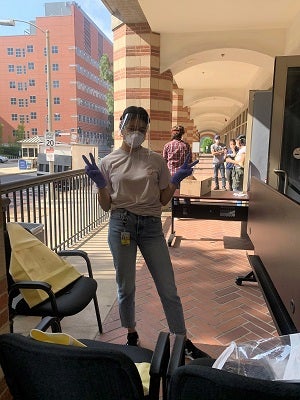
Additionally, the EOC established a UCLA COVID-19 Resumption of On-Site Activities Plan Review Process to supply a formal structure for resumption of operations that are in alignment with state and county allowances for higher education.
Since March, in addition to its regular duties and EOC support, EH&S has provided COVID-focused subject matter expertise on matters including disinfection practices, workplace mitigations, and development of a campus-wide COVID-19 training module.
EH&S has also been responsive to campus needs by coordinating a centralized Personal Protective Equipment (PPE) store to support the ramp-up of research on campus and related services. By centralizing this process, UCLA gains access to key suppliers and rapid bulk ordering opportunities as well as cost savings and increased availability of these supplies, which are often hard to acquire. EH&S staff has fit-tested 500+ individuals for respirators and has done consultative Covid-19 walkthroughs of research areas to ensure that on-site staff have access to resources and information they might need as they conduct critical research activities.
Events & Transportation
Like most departments, Events & Transportation (E&T) was impacted by COVID-19 and the suspension of non-essential campus operations. Despite the uncertainty surrounding the pandemic, everyone at E&T came together to support the campus community.
Parking Services staff remained on the ground at the Ronald Reagan UCLA Medical Center assisting arriving patients and visitors. Fleet & Transit was also on-site to ensure vehicle operations for essential functions continued uninterrupted. There was no break in service as team members kept University vehicles in top working order, including those utilized by the hospital. The team also made sure vehicles were supplied with disinfectant, paper towels, and hand sanitizer.
Bruin Commuter Programs shifted their entire in-person operation to phone, email, and online chat to continue assisting customers remotely. Over 650 calls were answered, almost 200 online chats were initiated, and nearly 3,600 emails received responses within the first few weeks of remote work.
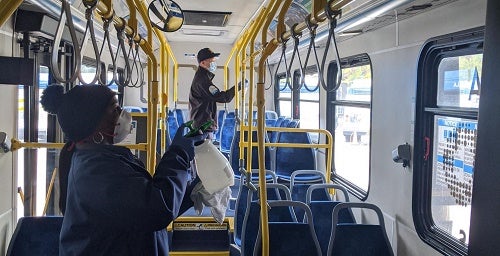
Integrated Marketing & Communications (IMC) has taken the lead in producing COVID-related safety messaging across campus, including signage for wearing a face covering and staying 6 feet apart. IMC also generated timely updates about E&T services through the website, emails, and social media, and shared the information with Strategic Communications to further reach campus audiences. A new intranet page was also created, highlighting employee resources during this time, and monthly virtual all-staff meetings have been hosted to keep employees informed and engaged. Training & Organizational Development also stepped up to help staff acclimate to remote work, hosting training sessions on virtual tools like Microsoft Teams and Zoom.
The administrative group distributed personal protective equipment and disinfectants throughout the organization during the early stages of the pandemic. They then managed requests for Kronos access for telecommuting employees, processed accruals, and ensured staff were properly informed of leave policies.
Finance & Accounting handled hundreds of refund requests remotely while IT modified the customer payroll deduction process to ensure parking, transit, and vanpool deductions were eliminated or reduced, and created a new process to automate transit pass loading.
Finally, the Events Office efficiently managed customers as event contracts were canceled and refunds were issued.
The entire E&T team continues to put its best foot forward during this challenging time for the University, adapting to the new reality and remaining committed to keeping UCLA moving forward.
Facilities Management
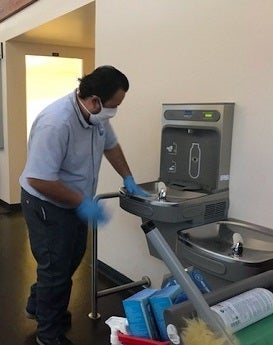
UCLA Facilities Management Custodial Services Department has worked closely with UCLA Clinical Epidemiology & Infection Prevention to create enhanced cleaning frequencies and disinfecting high-touch surfaces in all high-use common areas, restrooms, and public spaces throughout campus in accordance with CDC Disinfecting Guidelines.
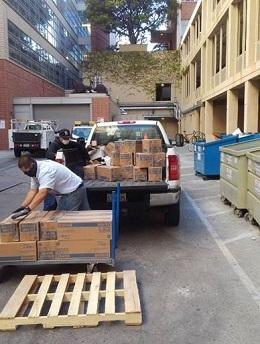
The department continues to focus on serving current essential operations and is prepared for the ramp-up of on-campus activities with operational plans to sustain enhanced cleaning, disinfecting services, and frequencies to all high-use areas. Cleaning and disinfection is done at least twice daily and more frequently if the perceived risk of environmental contamination is higher (e.g., shared spaces, high-pedestrian traffic spaces, common areas).
These new practices began April 20, 2020, and have been set in motion since. In addition, the team has developed a coordinated response plan for spaces on campus that have been exposed to COVID-19 to ensure proper disinfection.
Lastly, the Custodial Department is providing an Amazon like experience for UCLA Departments to purchase hard to get disinfect supplies through visiting our website at https://www.facilities.ucla.edu/covid19
Facilities Management's supply kitting and delivery process is in full swing and has been very successful. It represents an extremely innovative process for suppling our clients with cleaning products.
Crews have been flexible about working alternate shifts so the deliveries can be made Monday through Friday from 9:00 a.m. to 6:00 p.m. as well as on weekends if someone is around to receive the order.
Financial & Organizational Services
Financial & Organizational Services continues to provide financial and professional support across Administration and UCLA in response to COVID-19, including the following efforts:
- Developed and administered a COVID-19 Employee Feedback Survey to approximately 4,000 employees. Information from the survey assisted departmental planning efforts across the organization.
- Designed, implemented, and administered a campus-wide COVID-19 Symptom Monitoring system, in collaboration with UCLA Health, which provides clearance certificates to individuals who are able to return to campus and instructions for those who are not cleared. The scope extends to all members of the UCLA community, including employees, students, vendors, contractors, and PreK – 12 school children. The forms have been shared with and adopted by several UC campuses.
- Support in presenting revised financial forecasts as departments adjust their operations;
- Facilitate monthly submission of COVID financial impact templates to APB to provide the necessary information for federal and state aide;
- Review applications for COVID relief funds; and
- Collaborated with Kronos team to automate tracking of labor hours and activating new codes.
Housing & Hospitality
Since mid-March, the Hill—the heart of UCLA’s residential community that provides the rhythm of daily life for the 14,000 undergraduates who traditionally live there—has been eerily quiet as the campus community has responded to COVID-19.
Although students were strongly urged to return home to reduce the campus population, UCLA administrators committed to providing safe accommodations and resources for any student who remained.
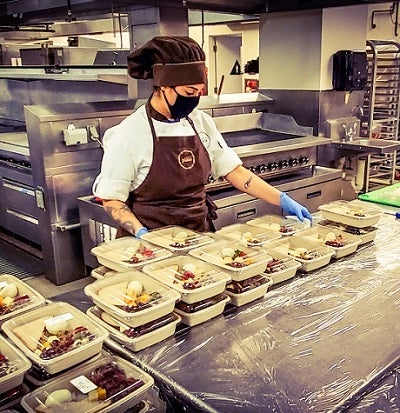
Of the 14,000 undergraduates who made the Hill their home during the school year, just 7% kept their housing contract through spring quarter once the pandemic hit. By summer that percentage dwindled to roughly 2.5%.
Students were consolidated into just a few buildings. Consolidation allowed housing staff to manage housekeeping and maintenance more efficiently with a reduced number of team members on-site. Each resident was given their own individual room and no longer used traditional communal bathrooms.
A key component to serving on-campus students over the past six months has been ensuring that they continued to eat well and stay safe while doing so. This summer, the De Neve dining hall fulfilled this need.
Self-serve buffet options were suspended and meals were exclusively take-out. Employees in all dining locations wore gloves and masks, and guests were instructed to personally swipe or tap their BruinCards for payment. Self-serve buffet stations were replaced with pre-portioned servings, and staff were on-hand to pour drinks from the beverage fountains. Stringent cleaning protocols, which have always been in place, were amplified to provide more frequent disinfecting of high-touch surfaces.
Flexibility and quick response to the evolving reality of the COVID-19 pandemic has been critical throughout campus. This fall, the Hill is expecting to house roughly 700 students and will be operating three dining establishments – Bruin Café, DeNeve and Bruin Bowl, a new destination for simple food and fresh, customizable meals.
IT Services
When our world changed in March, IT Services immediately responded to the rapidly changing environment to ensure that UCLA could continue operations and academic activities. In partnership with the UCLA Library, ITS immediately acquired hundreds of additional laptops and other devices to lend to students who needed them. When on-campus operations were minimized, ITS shipped equipment to people who were unable to come to campus. At the same time the network teams substantially boosted VPN capacity in order to accommodate more secure connections from off campus. ITS focused its energy and considerable technological talent on enabling effective remote work for all aspects of UCLA–adapting to developing solutions and supporting customers all while working remotely themselves.
As the campus prepares for the start of a virtual fall quarter, ITS is also coordinating implementation and development of a contact tracing application in collaboration with the UCLA Arthur Ashe Student Health & Wellness Center and UCLA Health to support efforts to keep the community safe. Acknowledging that nearly all instruction will be held remotely, ITS is partnering with academic IT units and instructional technology experts to provide easy access for faculty to get information and assistance. For customers in administrative departments, ITS continues to find and implement solutions to enable a variety of different kinds of work. Several key collaborative tools are available for remote work, and now prominently featured on the it.ucla.edu web site to offer information and training resources on how to leverage technology options available. IT Services staff have not only risen to the challenge, but taken it to the next level to enable UCLA to thrive during these uncertain times.
PreK-12 Programs and Schools
To support Bruin families, UCLA PreK-12 Programs and Schools spent the summer focused on the gradual return to operations allowable under new state and county health guidelines developed in response to the COVID-19 pandemic. The Early Care and Education (ECE) centers began to reopen in June, starting with 20 children at Krieger Center. Every two weeks more children began attending the center, forming small groups of stable cohorts consistent with new licensing regulations. Priority was given to UCLA-affiliated essential workers. Currently, ECE is operating its three childcare centers (Krieger, Fernald, and University Village) at full capacity given the new regulations, which equates to about 50% of pre-COVID capacity.
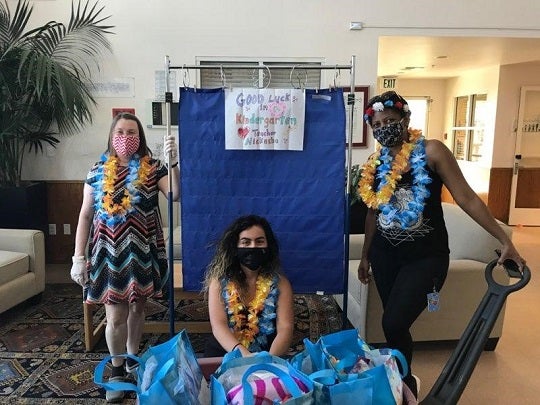
The UCLA Lab School hosted a summer day camp pilot program to test out some of the new health and safety protocols that will be required once K-12 schools are allowed to return to in-person instruction. The day camp ran for four weeks. Some of the new protocols tested were face coverings, daily symptom monitoring, on-site temperature screening, physical distancing, and hand hygiene routines. Hosting the camp allowed the school principal to observe and study the way operations will need to be adjusted for students to return to in-person instruction once allowed by state and county officials. The day camp pilot went smoothly and resulted in Principal Georgia Lazo‘s participation on a panel hosted by Los Angeles Times education reporter Howard Blume as well as in an on-camera interview for Spectrum News. UCLA PreK-12 Programs and Schools continues to prioritize the health and safety of children while providing much needed childcare options for families during this time.
UCLA Police

Public safety is 24/7, but like all departments on campus, the UCLA Police Department (UCPD) was impacted by COVID-19 and required a number of modifications to normal operations. These modifications were essential in order to ensure that public safety dispatchers could continue answering 911 and non-emergency calls, police officers could continue patrolling, Emergency Medical Technicians (EMTs) could continue responding to medical aid calls, and Community Service Officers (CSOs) could continue working their shifts and assisting departments on campus.
In the beginning of the pandemic when the University scaled back in-person operations, UCPD suspended a number of services in order to minimize the exposure to employees. The UCPD lobby was closed to the public and still remains closed except for specific purposes. Fingerprinting and lost and found services were suspended, ride-alongs and non-essential visitors to the police station were prohibited, and the CSO SafeRide service was temporarily paused. Department employees began telecommuting and slowly adapting to what would be the new normal for the coming months.
